Researchers now have a better understanding of the immune system in those experiencing long COVID-19 thanks to a newly published study funded by the National Institute for Health and Care Research (NIHR).
The study team were examining a type of immune cell called monocyte which travels through a person’s blood stream to their lungs where they surround and help kill the virus.
The researchers working at NIHR’s Manchester and Leicester Biomedical Research Centres (BRC) analysed blood samples from 71 hospitalised patients with acute COVID-19, 142 patients attending clinics after discharge from COVID-19, and healthy frontline workers.
It was subsequently established that irregular migration of these cells is linked to shortness of breath, as when investigating patients’ monocyte migratory signatures, the researchers discovered that long COVID-19 patients with shortness of breath had unique profiles compared to long COVID-19 patients with ongoing fatigue and those experiencing no symptoms at all.
The NIHR have indicated that the study findings could open up new research avenues and support the development of new treatments for COVID-19.
The study’s lead, Dr Elizabeth Mann, Wellcome Trust/Royal Society Sir Henry Dale Fellow at the University of Manchester’s Lydia Becker Institute, said: “Our work finding a link between monocyte function and specific long COVID symptoms may provide an important first step on the road to possible treatments.”
Tracy Hussell, who is a Professor of Inflammatory Disease and Programme Lead in the Next Generation Phenotyping and Diagnostics Theme at NIHR Manchester BRC, added: “This study is a prime example of the ‘one Manchester’ approach that provides seamless integration between clinicians and scientists under the umbrella of our NIHR Biomedical Research Centre and the generosity of our patient population.”
The research findings were published in the European Respiratory Journal.



















